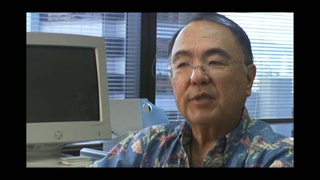Interviews
Asian Stereotypes
The stereotyping of people, specifically Japanese Americans, or the Japanese, I think, has played a powerful role in shaping who we are, and what we have become. And what we will be.
When Asians first started coming to the United States, they had discrimination from the outset. Immigrants coming from Asia could not become naturalized. So they were, by law, made foreigners in this country. And the Alien Land Law was passed, which denied land acquisition for, the term was, “Aliens ineligible for citizenship,” which meant Asians. But the word Asians wasn't used.
These laws, and these attitudes, were based on stereotypes that they had of Asians. And those stereotypes were reinforced by the stage plays at that time, by the newspaper cartoons at that time. And as society and the media grew, it became a part of the movies and part of songs stereotyping Asians. Stage plays that stereotyped Asians. And so when internment came down, it was those stereotypes that contributed to the hysteria of getting rid of the Japs from the west coast. During the war time, Chinese played the roles of Japanese. Those stereotypes. Asians rented out our faces to contribute to the maintenance of that stereotype. These stereotypes were created by whites that had no understanding of who we were as people. It was their vision of us, colored by the politics of that time. We contributed our faces to that.
But now things are changing. We have filmmakers now, who are Asian American. Writers. Producers. Directors, who are Asian Americans. As well as actors, who are Asian Americans. We are now telling our story from our perspective, in our voices, with our faces. And the faces are rooted in their genuine experiences. So we've made tremendous progress. We have television series now that depict Asian families. I haven't seen it yet, but I'm looking forward to Fresh Off the Boat. I have a couple of friends on that series. So we're making great progress. We need to now develop what I think are Asian American bankable stars, so that feature films now can be told from our perspective, in our voices.
Date: February 3, 2015
Location: California, US
Interviewer: John Esaki, Janice Tanaka
Contributed by: Watase Media Arts Center, Japanese American National Museum
Explore More Videos

Undergraduate studies interrupted following Pearl Harbor
(b. 1921) Nisei businessman. Established "Made in Oregon" retail stores

Difficulty getting work during World War II
(b. 1921) Nisei businessman. Established "Made in Oregon" retail stores

Discharged from the U.S. Army after Pearl Harbor
(b. 1918) Founder Azumano Travel


Stereotypes about Japanese: past and present (Spanish)
(b. 1937) Professional journalist

World War II hysteria against Japanese in New York City
(1924-2018) Researcher, Activist




Being an American soldier and an "enemy alien"
(1923-2011) Lawyer, MIS veteran, founder of Francis and Sarah Sogi Foundation

Not relating to Japan Americans' experiences on the mainland
(1923-2011) Lawyer, MIS veteran, founder of Francis and Sarah Sogi Foundation


Living conditions in prison while serving time for resisting the draft
(b. 1925) Draft resister

Talking to children about decision to resist the draft during World War II
(b. 1925) Draft resister

Reflecting on Japanese Americans' response to incarceration
(b. 1925) Draft resister
